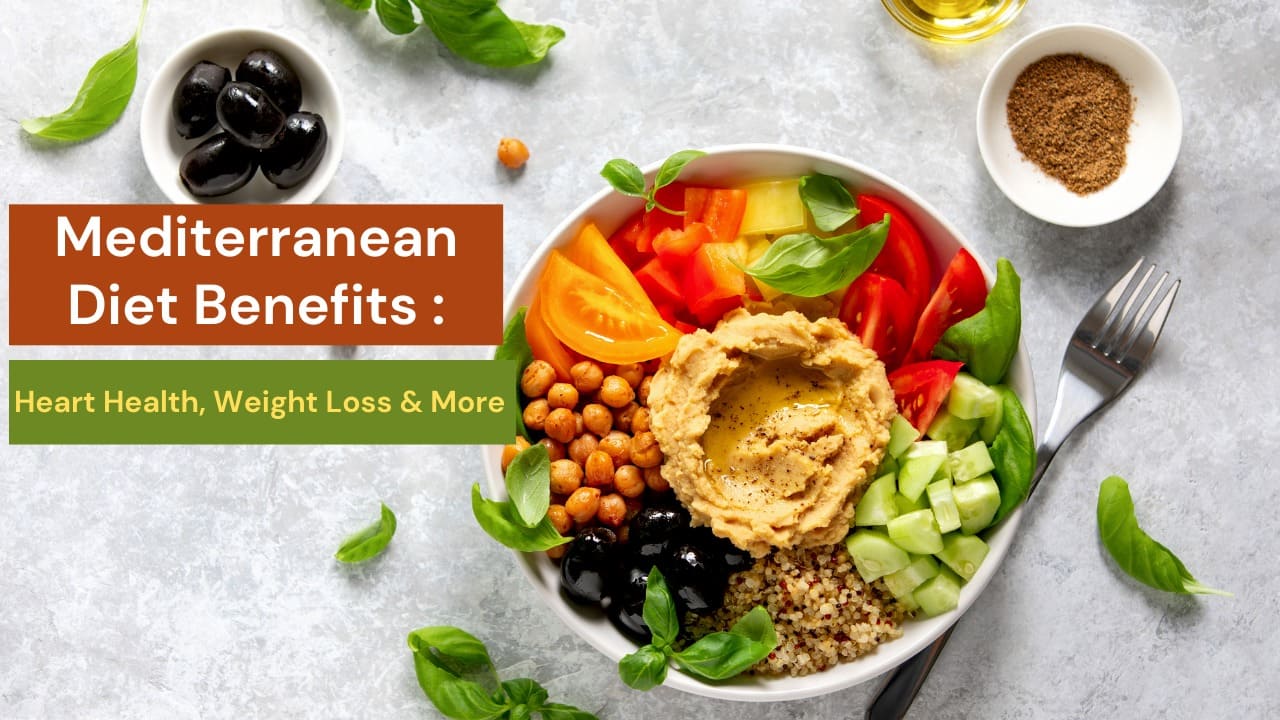In today’s world full of quick-fix diets and passing health trends, the Mediterranean diet continues to shine as a reliable and long-lasting approach to healthy eating. It has gained respect for its ability to support both heart health and overall wellness without requiring extreme restrictions or complicated rules.
This diet is based on the traditional food habits of people living near the Mediterranean Sea, especially in countries like Greece, Italy, and Spain. Their meals are rich in fruits, vegetables, whole grains, legumes, nuts, and olive oil, along with moderate amounts of fish, dairy, and wine.
What makes the Mediterranean diet unique is its balance, simplicity, and flavor. It promotes mindful eating and encourages fresh, home-cooked meals shared with others. Backed by science and praised by health experts worldwide, it is more than just a diet—it’s a healthy and enjoyable lifestyle that supports long-term health.
What Is the Mediterranean Diet ?
The Mediterranean diet is not about strict rules or counting every calorie. Unlike many modern diet plans, it doesn’t require people to follow a rigid structure or eliminate entire food groups. Instead, it focuses on balance, enjoyment, and long-term health.
At its core, the Mediterranean diet is a flexible way of eating. It emphasizes fresh, whole foods like vegetables, fruits, whole grains, legumes, nuts, and healthy fats such as olive oil. Fish and seafood are included regularly, while red meat is eaten only occasionally. This approach allows people to enjoy a wide variety of foods without feeling restricted.
This eating pattern is inspired by the traditional diets of people living in Mediterranean countries like Greece, Italy, and Spain. Their meals are not only healthy but also rich in flavor, often enjoyed with family and friends in a relaxed setting.
What makes the Mediterranean diet appealing is that it fits easily into everyday life. It supports good health while encouraging mindful, enjoyable eating without stress or strict limitations.

Core Components:
High consumption of: Fresh fruits, vegetables, whole grains, legumes, nuts, seeds, and olive oil.
Moderate consumption of: Fish, poultry, dairy (especially yogurt and cheese), and red wine (in moderation).
Low consumption of: Red meat, processed foods, and sweets.
Lifestyle emphasis: Regular physical activity, meals enjoyed with family and friends, and a mindful, stress-free approach to eating.
This combination of wholesome foods and a healthy lifestyle makes the Mediterranean diet more than just a diet—it’s a way of life.
Importance of the Mediterranean Diet
Why has the Mediterranean diet garnered global attention, awards, and scientific endorsements?
Here are some key reasons behind its growing importance:
Scientifically Proven: The Mediterranean diet is widely recognized and supported by science. It has earned top rankings from U.S. News & World Report as the #1 diet for overall health, heart health, and diabetes prevention. The World Health Organization (WHO) also acknowledges its positive impact on long-term wellness and disease prevention.
Culturally Sustainable: Rather than focusing on strict rules or food restrictions, the Mediterranean diet is rooted in culture and tradition. This makes it easier for people to stick with and enjoy over time, turning healthy eating into a natural part of daily life.
Disease Prevention: Studies show that following the Mediterranean diet can lead to lower risks of several chronic conditions. These include heart disease, type 2 diabetes, Alzheimer’s disease, and even some forms of cancer, making it a powerful tool for long-term health.
Environmental Sustainability: The Mediterranean diet supports the environment by focusing on plant-based foods and eco-friendly seafood choices. This makes it a smart option for both health and the planet.
Promotes Mental and Emotional Well-being: The Mediterranean diet encourages more than just healthy eating. It promotes shared meals, physical movement, and a balanced lifestyle, supporting mental health and emotional well-being.
Top Mediterranean Diet Benefits
Let’s take a deep dive into the top scientifically supported benefits of following the Mediterranean diet.
Promotes Heart Health

One of the most well-known Mediterranean diet benefits is its strong support for heart health. This eating pattern has been studied by researchers around the world and is often recommended for people looking to protect their heart.
Large-scale studies have found that those who follow the Mediterranean diet have a much lower risk of serious heart problems. These include a reduced chance of experiencing heart attacks and strokes, as well as a lower risk of dying from cardiovascular-related causes.
The Mediterranean diet focuses on heart-friendly foods like olive oil, nuts, fish, vegetables, and whole grains. These nutrient-rich choices help reduce inflammation, support healthy blood vessels, and improve cholesterol levels, all of which are key to maintaining a healthy heart. Overall, one of the major Mediterranean diet benefits is its natural and effective approach to protecting cardiovascular health.
Why it works
Olive oil, rich in monounsaturated fats and antioxidants, reduces inflammation and LDL (bad) cholesterol.
Nuts and seeds contain healthy fats and omega-3s.
Fish, especially fatty fish like salmon and sardines, offers heart-protective omega-3 fatty acids.
A famous study, PREDIMED (Prevención con Dieta Mediterránea), found that those on a Mediterranean diet supplemented with olive oil or nuts had a 30% reduction in cardiovascular events.
Reduces Risk of Type 2 Diabetes
With diabetes becoming more common around the world, finding healthy and effective ways to manage and prevent it is more important than ever. One of the key Mediterranean diet benefits is its ability to support blood sugar control and improve overall metabolic health.
This way of eating focuses on whole, natural foods like fruits, vegetables, whole grains, healthy fats, and lean proteins. These foods help keep blood sugar levels steady and reduce the risk of insulin resistance, which is a major factor in type 2 diabetes.
People who follow the Mediterranean diet are often better able to manage their weight and maintain balanced blood sugar levels. As a result, it is not only helpful in preventing diabetes but also in supporting those who already live with the condition. Among the many Mediterranean diet benefits, its role in diabetes care makes it a valuable part of a healthy lifestyle.
How it helps
Whole grains and legumes provide steady energy and regulate blood sugar.
Fiber-rich vegetables and fruits slow down glucose absorption.
Low glycemic index foods help prevent insulin spikes.
Research shows that Mediterranean diet followers have better blood sugar control and insulin sensitivity than those on low-fat diets.
Supports Weight Loss and Healthy Weight Maintenance

The Mediterranean diet is not built around strict calorie counting, yet it can still support healthy weight loss and weight management. One of the important Mediterranean diet benefits is that it helps people feel full and satisfied while eating nourishing foods.
This way of eating emphasizes whole, nutrient-dense foods such as vegetables, fruits, legumes, whole grains, and healthy fats like olive oil. These foods provide long-lasting energy and help reduce unhealthy cravings, which can naturally lead to eating less without feeling deprived.
Mindful eating is also a big part of the Mediterranean lifestyle. Meals are often enjoyed slowly, with others, and in a relaxed setting. This approach supports better digestion and helps prevent overeating. Among the many Mediterranean diet benefits, its ability to encourage natural weight control without stress or restriction is one of the reasons it’s loved by so many people.
Benefits include
Reduced belly fat
Better metabolism
Lower body mass index (BMI)
Unlike crash diets, the Mediterranean approach promotes long-term sustainability and helps avoid yo-yo dieting.
Protects Brain Health and Reduces Risk of Alzheimer’s Disease
One of the lesser-known but powerful Mediterranean diet benefits is its positive effect on brain health. Research shows that this eating pattern may help protect the brain as we age, supporting memory, focus, and overall cognitive function.
Many studies have found that people who follow the Mediterranean diet tend to have better mental clarity and experience slower cognitive decline over time. This is likely due to the high intake of healthy fats, antioxidants, and anti-inflammatory foods that are known to nourish brain cells.
The Mediterranean diet has also been linked to a reduced risk of developing neurodegenerative diseases, including Alzheimer’s. By supporting brain health naturally through balanced and nutritious meals, it offers long-term protection. These Mediterranean diet benefits show that it’s not just good for the body—it’s also a smart choice for keeping the mind sharp and healthy as we grow older.
How it works
Antioxidants from fruits, vegetables, and olive oil combat oxidative stress.
Omega-3s from fish enhance brain function.
Polyphenols in wine (in moderation) and berries improve blood flow and reduce brain inflammation.
According to a study in the journal Neurology, older adults who adhered closely to the Mediterranean diet had a 33% lower risk of developing Alzheimer’s disease.

Lowers Risk of Certain Cancers
One of the important Mediterranean diet benefits is its potential to reduce the risk of certain cancers. The diet is rich in plant-based foods, healthy fats, and powerful antioxidants, all of which play a role in protecting the body at the cellular level.
By focusing on fruits, vegetables, legumes, whole grains, and olive oil, the Mediterranean diet helps reduce inflammation and oxidative stress. These are two major factors that can contribute to the development of cancer over time.
Studies suggest that people who follow this way of eating may have a lower risk of developing several types of cancer, including breast, colorectal, and prostate cancers. These Mediterranean diet benefits highlight how a simple and enjoyable eating pattern can support long-term health and provide powerful protection against serious diseases. It’s another reason why the Mediterranean diet is valued worldwide.
Protective factors
High fiber intake promotes gut health and eliminates carcinogens.
Phytonutrients in fruits and vegetables reduce inflammation.
Healthy fats and minimal processed meat reduce cancer-promoting factors.
The anti-inflammatory and immune-boosting effects of Mediterranean foods are key to cancer prevention.
Improves Gut Health
A healthy digestive system is essential for overall well-being, and one of the key Mediterranean diet benefits is its support for gut health. This way of eating naturally encourages the growth of beneficial bacteria in the digestive tract.
The Mediterranean diet is rich in fiber from fruits, vegetables, legumes, and whole grains. These fiber-rich foods feed the good bacteria in the gut, helping to create a balanced and diverse microbiome. A strong microbiome can improve digestion, boost immunity, and reduce inflammation in the body.
In addition to fiber, the Mediterranean diet includes fermented foods and healthy fats, which also support digestive function. By promoting a healthier gut environment, this eating pattern helps the entire body function better. Among the many Mediterranean diet benefits, improved gut health is a major reason why it’s recommended by health experts around the world.

Why it’s gut-friendly
Prebiotic-rich foods like onions, garlic, and legumes feed beneficial bacteria.
Fermented dairy like yogurt and kefir offer probiotics.
Fiber from whole grains and veggies promotes regular digestion.
A balanced gut microbiome is not only essential for digestion but also plays a role in mental health, immunity, and weight regulation.
Enhances Longevity and Quality of Life
If you want to live longer and enjoy a healthier life, one of the top Mediterranean diet benefits is its strong link to longevity. This eating pattern is often connected to a reduced risk of age-related diseases and improved overall well-being.
People living in the world’s “Blue Zones”—areas known for high numbers of people living past 100—often follow traditional Mediterranean eating habits. Places like Sardinia in Italy and Ikaria in Greece credit their residents’ long and active lives to this balanced, plant-rich diet.
The Mediterranean diet supports healthy aging by reducing inflammation, improving heart health, and maintaining strong brain function. These benefits add up over time, helping people not only live longer but also feel better as they age. Among all Mediterranean diet benefits, its contribution to vitality and longevity is one of the most inspiring and scientifically supported.
Key longevity factors
Anti-inflammatory foods
Balanced lifestyle with physical activity
Strong social and family connections around meals
Following this diet can help you age gracefully with fewer health complications.
Boosts Emotional and Mental Well-being

New research continues to reveal more Mediterranean diet benefits—not just for the body, but for the mind as well. This way of eating has been linked to better emotional well-being and a lower risk of mental health issues.
A 2017 study published in BMC Medicine found that people with depression who adopted a Mediterranean diet saw clear improvements in their mood and overall mental health. The study highlights how the diet’s nutrients may support brain function and reduce symptoms of depression.
The Mediterranean diet includes foods rich in healthy fats, antioxidants, and essential vitamins, all of which can positively influence brain chemistry and reduce inflammation. These Mediterranean diet benefits go beyond physical health, offering natural support for emotional balance and mental clarity. As science continues to explore this connection, the diet stands out as a nourishing choice for both mind and body.
Mental health boosters:
Omega-3s and B vitamins support neurotransmitter function.
Stable blood sugar reduces mood swings and anxiety.
Social eating and cultural rituals encourage joy and connection.
This holistic approach helps combat depression, stress, and cognitive fatigue naturally.
Tips to Get Started with the Mediterranean Diet
Here are a few practical tips:
Use olive oil as your primary cooking fat.
Eat more vegetables—aim for half your plate.
Snack on nuts instead of chips or candy.
Choose fish or legumes as your protein source 2-3 times a week.
Enjoy whole grains like quinoa, brown rice, and barley.
Drink water or red wine in moderation.
Eat meals with others and savor your food mindfully.
Conclusion

Including the Mediterranean diet into your lifestyle is one of the most effective and sustainable ways to improve your overall health and well-being. The Mediterranean diet benefits are backed by extensive research, showing its positive impact on heart health, weight management, brain function, and longevity.
With its focus on whole foods, healthy fats, and regular physical activity, this diet promotes a balanced, nutrient-dense way of living. Beyond physical health, it also encourages mindful eating, social connection, and emotional well-being.
By embracing this dietary pattern, you not only nourish your body but also enhance your quality of life, helping you live longer, healthier, and happier. Whether you’re looking to prevent chronic diseases or simply adopt a more mindful and fulfilling way of eating, the Mediterranean diet provides an enriching path toward better health.
FAQs
Q.1 What foods are included in the Mediterranean diet ?
The Mediterranean diet focuses on whole grains, fresh fruits, vegetables, nuts, seeds, legumes, olive oil, and moderate amounts of fish, poultry, and dairy. Red meat is consumed sparingly, and sweets are enjoyed occasionally.
Q.2 Can the Mediterranean diet help with weight loss ?
Yes, the Mediterranean diet promotes weight loss by emphasizing nutrient-dense foods that are naturally satisfying. It encourages portion control and mindful eating, which can lead to healthy, sustainable weight management.
Q.3 Is the Mediterranean diet good for heart health ?
Absolutely! The Mediterranean diet is renowned for its heart-healthy benefits, reducing the risk of heart disease, high blood pressure, and stroke due to its focus on healthy fats like olive oil and omega-3-rich fish.
Q.4 How does the Mediterranean diet support brain health ?
The Mediterranean diet is rich in antioxidants, healthy fats, and omega-3s, which have been linked to improved cognitive function and a reduced risk of Alzheimer’s and other neurodegenerative diseases.
Q.5 Can I drink alcohol on the Mediterranean diet ?
Yes, but in moderation. Red wine is often consumed with meals in Mediterranean cultures, and studies suggest it may offer some health benefits. However, it’s important to limit alcohol intake to moderate levels—typically one glass per day for women and up to two for men.


